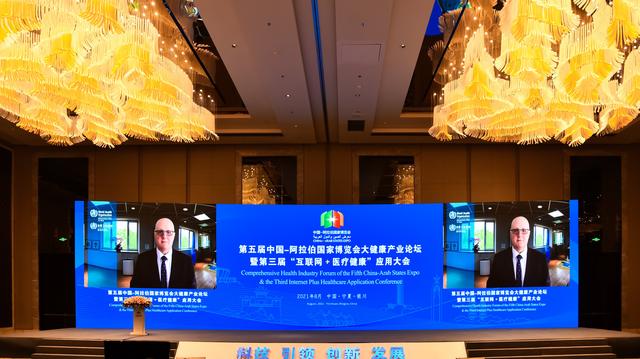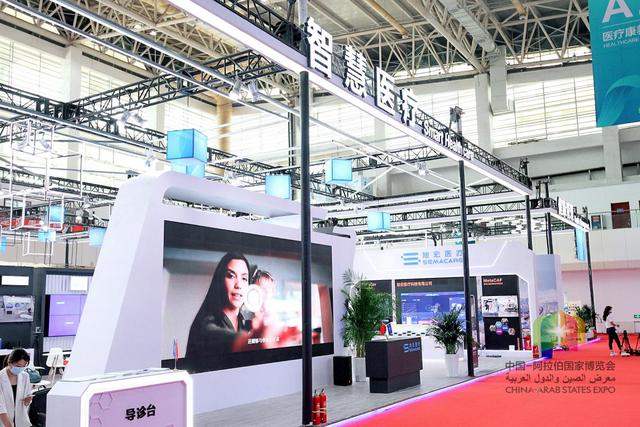Digital transformation promotes the construction of human health community

Gao Li, the representative of WHO in China, made a video speech at the 5th China-Arab Great Health Industry Forum and the 3rd "Internet+Medical Health" application conference. Photo courtesy of Health and Health Commission of Ningxia Hui Autonomous Region
Xinhua News Agency, Yinchuan, August 22nd (Reporter Ai Fumei, Ma Sijia) Big data pre-judgment, intelligent diagnosis and transnational long-distance surgery guidance & HELIP; … The rapid development of digital technology provides new opportunities for improving human health and is promoting the construction of human health community.
At the 5th China-Arab Great Health Industry Forum and the 3rd "Internet+Medical Health" Application Conference held in Yinchuan, Ningxia, the deep integration of digital technology and health has become the focus of the guests.
Gao Li, the WHO representative in China, said in a video speech that digital technology is crucial to the realization of national health and provides new opportunities for improving human health. Cutting-edge technologies such as Internet of Things, remote monitoring, artificial intelligence, big data and smart wearable devices have unlimited potential, which can support health service systems, enable more people to enjoy better diagnosis and treatment services and people-oriented comprehensive health services, and help professionals master more evidence-based medical tools.
In 2018, the World Health Assembly adopted a resolution calling on WHO to formulate a global digital health strategy to support countries to achieve full coverage of health services. WHO released the first guideline for digital health intervention in 2019, and released the Global Strategy for Digital Health (2020-2025) last year.
"Using scientific and technological innovation to improve the health of the whole people and enhance people’s well-being has broad prospects and great potential." Gao Li said.
In today’s world, the development of network information technology is changing with each passing day, and many countries have taken digital health as the strategic direction of medical health transformation and upgrading.
Yu Xuejun, deputy director of the National Health and Wellness Commission, said that there are currently more than 1,600 Internet hospitals in China, and hospitals above the second level generally provide online services. In 2020, there were 48.91 million Internet consultations nationwide.
“‘ Internet+medical health ’ It has become an important part of the medical and health service system, especially during the COVID-19 epidemic, giving full play to ‘ Contact-free ’ Advantages, opened up an online anti-epidemic ‘ The Second Battlefield ’ 。” He said.

At the fifth China-Arab Expo held in Yinchuan, Ningxia, a smart medical exhibition area was set up. Photo courtesy of Health and Health Commission of Ningxia Hui Autonomous Region
Nowadays, in many cities in China, the whole medical path of appointment, diagnosis and treatment, payment, drug distribution and health management has been digitized, and rural residents can also enjoy better medical services at their doorsteps through intelligent diagnosis and remote consultation.
For expectant mothers who live in Helanshan Farm in Xixia District, Yinchuan City, Ningxia Hui Autonomous Region, because of the development of digital technology, they don’t have to go to the city with a big belly for regular checkups.
"Many primary medical institutions don’t have diagnostic talents, and they don’t have the ability and qualification to issue ultrasonic reports. Now, with the help of remote ultrasonic diagnosis platform, ‘ Primary inspection, superior diagnosis ’ Homogeneous management. " Yuan Hongmei, an ultrasonic diagnostic doctor at the People’s Hospital of Ningxia Hui Autonomous Region, said.
Zhang Boli, an academician of China Academy of Engineering, also pointed out at the forum that the rapid development and application of modern science and technology, such as artificial intelligence and big data, enabled the industrial Internet to empower smart medical care and promote the healthy China strategy to develop in depth.
Benefiting from the development of digital technology, China’s medical community is also sharing the "China Plan" with other countries, especially those with relatively backward medical technology.
Benin is a traditional friendly country of China in West Africa. Since 1978, China (Ningxia) has sent 25 foreign aid medical teams to Benin.
In recent years, the medical team has carried out a number of telemedicine practices in Benin, including remote consultation to formulate the optimal surgical plan for fracture patients, remote surgical guidance to remove "giant thyroid tumor" and remote diagnosis of electrocardiogram. September 2019, China — Benin Telemedicine Cooperation Center was officially inaugurated.
In the joint fight against the COVID-19 epidemic, China not only provided vaccines and medical equipment to Arab countries and dispatched medical teams, but also held many expert video conferences to share prevention and control measures and plans.
Mahmoud Amin, director of the representative office of the League of Arab States (LAS) in China, believes that medical and health cooperation between Arab countries and China is of great benefit. In recent years, by introducing new mechanisms, expanding new scope and deepening cooperation in medical institutions, medical technology research, prevention and control of infectious diseases, traditional medicine and training of medical personnel, the willingness of cooperation between China and Arab countries in the medical and health field is unprecedented, and a new mode of cooperation has been opened.
"On behalf of the Arab League, I would like to thank China for its help to Arab countries." Amin expressed the hope that this forum will strengthen the cooperation between China and Arab countries, so that Arab countries can learn from China’s experience in the health field and benefit from it.
"We are willing to work with you to profoundly grasp the new opportunities and new space brought about by digital changes and promote the construction of a healthy and healthy community for human beings." Yu Xuejun said.